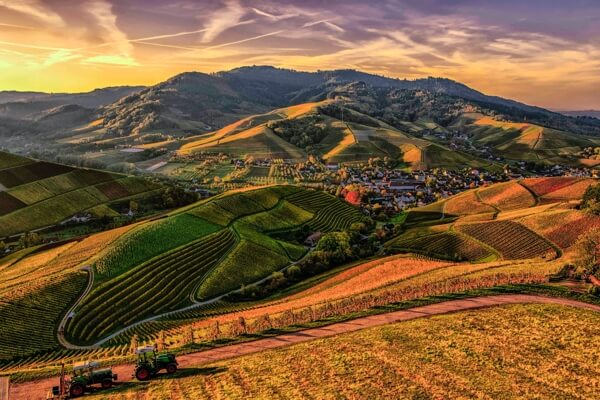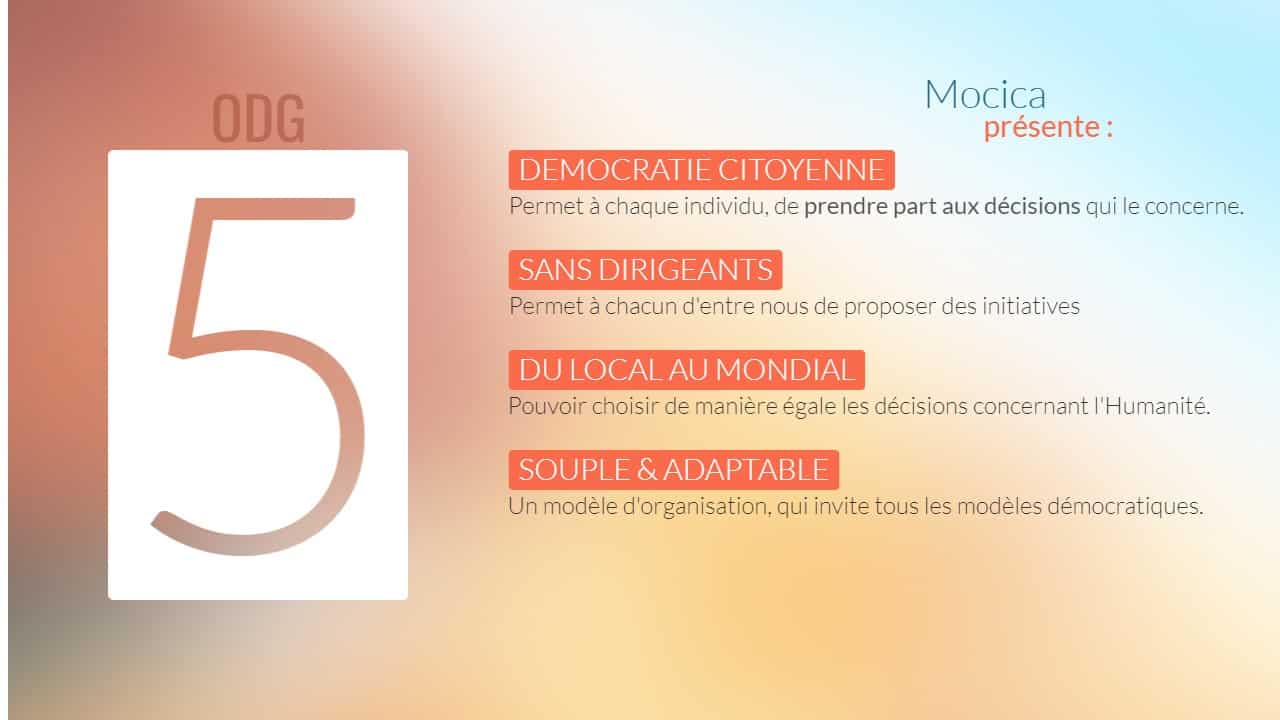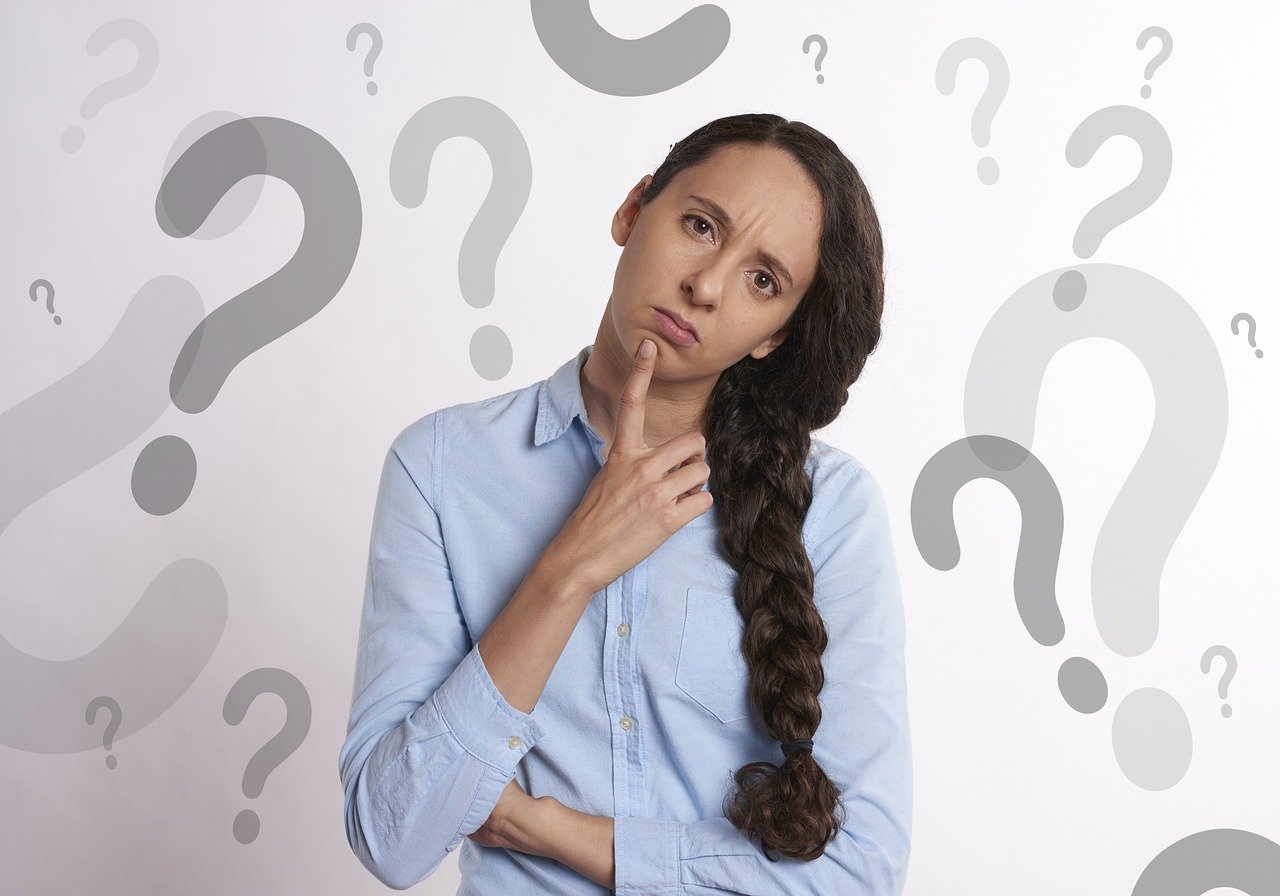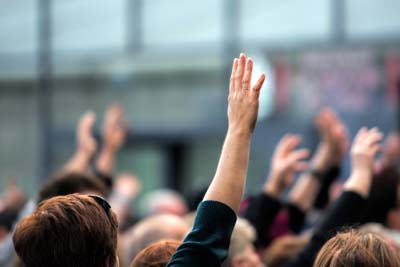Notes :
The elements presented below are set up by default to allow assemblies to organise themselves. They can be modified, adapted and evolved according to the choices of the inhabitants.
Is the Global Democratic Organisation political?
The Grand Projet does not fit into traditional political movements.
On the other hand, the Global Democratic Organisation, which will allow the people to take decisions, has a proven political character. Indeed, it even has the ambition to federate the majority of humanity and encourages, as its name indicates, the transition to a Global Democratic Organisation. Inspired by the principles of Sociocracy and Democracy, which draws from each of them the elements necessary for common sense to organise itself while leaving the choice to the people to make proposals and changes. It is not a political party but a new form of shared governance.
The particularity of this type of organisation is that it is built in networks and without leaders. Decisions are taken by consent-seeking assemblies or, failing that, by vote of the inhabitants.
Why work in assemblies?
The assemblies of the Global Democratic Organisation (G.D.O.) allow :
1) to propose an alternative to the classic pyramidal mode of governance consisting of
a more or less formal combination of majority votes and decisions
autocratic.
2) to promote the implementation of participatory and direct democratic processes in the
in which initiative and power are fairly distributed.
3) todevelop spaces for cooperation and collaboration rather than spaces
dominated by competition.
4) to encourage listening, dialogue and creativity.
5) to co-construct decisions and projects through processes aimed at
développement de l’intelligence collective.
How do assemblies work?
The Global Democratic Organisation (GDO) is composed of several assemblies, whether they are thematic for the organisation of trades or autonomous for the management of zones. whose intentions are common on the following points:
Main intention of each assembly :
Benevolence.
Larousse definition: A disposition of mind inclined to understanding, to indulgence towards others.
Wikipedia definition: Benevolence is the affective disposition of a will that aims at the good and happiness of others.
The facilitators (see below) will have the task of ensuring that benevolence is at the centre of our exchanges, so we can be sure that everyone (and every assembly) will act in a spirit of listening and that the proposals will be for the good of all and respect for the planet.
Secondary intention of each assembly :
– Resource sharing.
– Exercising one’s vocation to others without compensation.
– Citizens’ democracy.
– Sharing of arduous tasks.
– Determine the organisational arrangements.
The mission of the G.D.O. is to enable a network organisation that respects the planet and its inhabitants. It aims to allow each circle (Citizens’ Assembly or thematic assembly) to organise itself autonomously and allows each inhabitant to vote on the laws that concern him or her at each level: neighbourhood regulation, city, region, country and even to take part in global decisions.
How is the G.D.O. organised?
It consists of 5 zones of different sizes and, depending on the level, several zones of the same size representing :
Zone 1: Neighbourhood
Zone 2: Municipalities
Zone 3: Regions
Zone 4: Countries
Zone 5: World
Scheme of the Global Democratic Organisation
Election process :
The election process we encourage is the election without candidates. It has the advantage of not encouraging strong minds to campaign. It also helps to bring forward discrete citizens who have the necessary qualities. The term of the mandate is usually defined before any election by each assembly, but it is also possible not to fix the mandate’s period. Any member of an Assembly who wishes to do so is eligible for elected roles. A member may hold more than one elected role, with the exception of the First Coordinator, who may not combine his or her role as First Coordinator with that of Facilitator or Second Coordinator.
What are the roles in an assembly?
Each of the assemblies consists of the coordinators elected by the previous zone.
These elected coordinators will all have the role of carrying the word of their assembly (and expressing the result of the votes of their zone) and for some a precise role (each assembly determines its roles) which can be :
Necessary roles :
(These are roles elected through the election process without candidates).
– The First Coordinator: is responsible for the link with the next zone (e.g. the departmental coordinator is elected by “election without candidates” and will be responsible for reporting to the regional level the choices of the citizens of the department). (He/she has no decision-making power).
– The second coordinator: He/she is in charge of the link with the previous zone (e.g.: The coordinator of the country zone will be elected by the regional coordinators. He/she will be in charge of reporting to the global level the choices and demands of the citizens of the country). (He/she has no decision-making power).
– The Facilitator: The mission of the Facilitator role is to ensure that the assembly respects the rules of governance and the operational processes adopted by the organisation.
– The Secretary: Reinforces the internal governance of the Circle by keeping the Circle’s records and ensuring that these records are properly maintained.
Additional roles :
– Stakeholders: This refers to any organisation, group or institution whose purpose is related to the theme of the meeting. Stakeholders are pre-selected by the coordination committee and invited to participate in the process.
– Experts: An expert is any person who specialises in the field in question, whether by profession, training or experience. Experts are selected and invited by the Coordination Committee, but the members of the Assembly may decide to appoint new experts during the process.
– Any person assigned to fulfil one or more Roles defined by the assembly.
– Any additional person appointed or invited by the First Co-ordinator of the meeting or co-opted by the members of the meeting on the basis of procedures defined by it for this purpose.
Who is responsible for organising and checking?
Organisational Assembly.
Is responsible for designing procedures for draws, hearings and votes.
The mission of this assembly is to ensure that the rules established for the organisation of the citizens’ assembly are respected.
Regulatory Assembly.
It ensures that people apply the procedures correctly and investigate any complaints. They are drawn from people who have already served on a panel of drawn members, as they know the procedures in detail.
How does it work?
1, Every citizen is free to create a public suggestion or proposal directly in the MOCICA application on app.mocica.org.
2, Suggestions that receive the most ‘pre-votes’ from the public are given priority.
3, The selected suggestions and the reasons for them are formatted with the participation of the people who made them in the autonomous assembly.
4, They are then put on the agenda during the meetings of the zones associated with each proposal, with the participation of the people who made them, if they wish so.
The topic is exchanged in an open discussion between the members of the assembly plus the various experts that may be needed to address the topic and the stakeholders. The discussion takes place in an objective manner and with respect for the main intention of the assembly (Benevolence). This is supported by the Facilitator, to allow for clarifying questions, rounds of feedback or objection etc.
The aim is to reach a solution by consent.
In the G.D.O., consent is being sought.
(The most common decision-making process used in shared governance is management by consent. Consent means that there are no valid and reasoned objections to a proposal that is the subject of the decision. In other words, no decision will be made if any member of the assembly has reasonable objections).
More details here (members only access)
The assembly is working to find consent in a systematic way. Nevertheless, some subjects may still end up without consent. The assembly can then decide to have the inhabitants concerned vote.
Prenons un exemple :
1- One person makes a suggestion to generalize permaculture in the world.
2- The suggestion is a resounding success. It becomes confirmed.
3- The text is formatted and presented at the World Assembly (Zone 5)
4- The subject is discussed by specialists from different sectors concerned (all elected by the principle of election without candidates) as well as the members of Assembly 5 (all nation coordinators). The latter are charged with concluding the ‘pros’ and ‘cons’ of the spread of permaculture around the world in an objective and compassionate manner. If the consent allows, the proposal is validated. Otherwise there is a vote of the population.
5- These results lead to a global vote of the population “for” or “against” mainstreaming permaculture.
6- Results of the votes circulated to all nation assemblies by the coordinators.
7- The assembly develops the global standard and measures for mainstreaming permaculture.
8- The standard is then applied by each nation.
To summarise:
The proposed model combines direct democracy and representative democracy through elections without candidates. Decisions are made by consent in a meeting or vote by referendum in the absence of consent. The elected coordinators act as intermediaries and do not take decisions other than those validated by the assembly. The thematic assemblies are responsible for implementing the decisions of the autonomous assemblies. The inhabitants retain the possibility to question all or part of a decision of an autonomous assembly.












